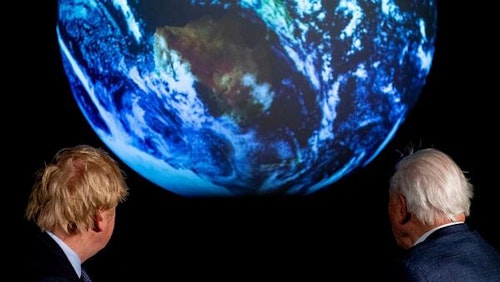As crucial climate talks kicked off in Glasgow with "doomsday" warnings, here are five key takeaways from Day One of the COP26.
COP26 got underway on Monday with “doomsday” warnings from world leaders and environmentalists. But there were also renewed commitments to tackle climate change.
Here are five key takeaways from Day One of the COP26 :
1. World leaders resort to end-of-the-world rhetoric to highlight climate emergency
Opening the summit, UK Prime Minister Boris Johnson compared global warming to “a doomsday device'' strapped to humanity.
“We are digging our own graves,'' added UN Secretary-General Antonio Guterres.
Barbados Prime Minister Mia Mottley, speaking for vulnerable island nations, warned leaders not to “allow the path of greed and selfishness to sow the seeds of our common destruction.”
2. Countries set out national commitments to tackle climate crisis
Scores of heads of state spoke about what their country is going to do about the threat of global warming.
India's PM Modi said that his country will achieve net-zero by 2070, two decades later than the summit’s target. India is the world’s fourth-biggest carbon emitter and before now had not announced a plan to reach net-zero.
Spanish Prime Minister Pedro Sánchez announced that his government would increase its climate funding by 50 per cent in the next few years.
Meanwhile, German Chancellor Angela Merkel called for the introduction of global carbon pricing.
3. Leaders from top polluting nations skip summit
Xi Jinping, president of top carbon polluting nation China, and Russian President Vladimir Putin were not in Glasgow.
Turkish President Recep Tayyip Erdogan pulled out of the conference at the last minute.
Several other major emerging economies are also skipping Glasgow, including those from Russia, Mexico, Brazil and South Africa. That leaves Modi the only leader present from the so-called BRICS nations, which account for more than 40% of global emissions.
Several small nations from the Pacific islands couldn’t make it because of COVID-19 restrictions and logistics.
4. Climate activists put pressure on world leaders at COP26
Outside the negotiations, youth climate activist Greta Thunberg accused world leaders of “pretending to take our future seriously.”
“Change is not going to come from inside there,” Thunberg said, “We say no more blah-blah-blah.”
Kenyan campaigner Elizabeth Wathuti urged world leaders to take action, describing the devastation wrought by climate change in her community.
"Over two million of my fellow Kenyans are facing climate-related starvation," she said.
5. Expectations remain low after vague G20 climate pledges
G-20 leaders in Rome only offered vague climate pledges, saying they would seek carbon neutrality "by or around mid-century.''
In their final communique, the Group of 20 leaders also agreed to end public financing for coal-fired power generation abroad, but set no target for phasing out coal domestically — a clear nod to top carbon polluters China and India.
According to the communique, the G-20 reaffirmed past commitments by rich countries to mobilise $100 billion (€86.50) annually to help poorer countries cope with climate change, and committed to scaling up financing for helping them adapt.
A key sticking point remained the deadline for nations to reach carbon neutrality or “net-zero” emissions, meaning a balance between greenhouse gases added to and removed from the atmosphere.
Follow the latest developments on our live blog here:

 ${title}
${title}
Live ended
That's all for us tonight. We will be back tomorrow with more COP26 updates.
Queen Elizabeth's message to COP26
“History has shown that when nations come together in common cause, there is always room for hope,” she said in the video, which was recorded on Friday at Windsor Castle.
Thunberg accuses world leaders of 'betrayal'
Outside the negotiations, youth climate activist Greta Thunberg accused world leaders of “pretending to take our future seriously.”
“Change is not going to come from inside there,” Thunberg said, “We say no more blah-blah-blah.”
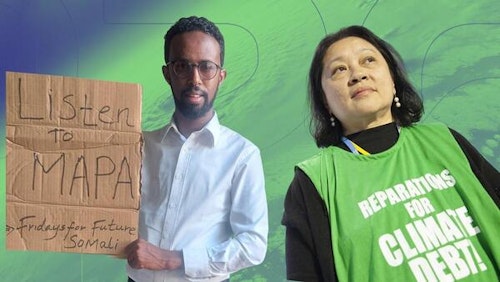
The missing voices of the most affected: Who isn’t at COP26?
'With much reduced Southern presence at COP26, it will be a more inequitable and undemocratic process than ever.'EC chief says Europe to be first net-zero continent
European Commission President, Ursula von der Leyen reiterated Europe's ambition to become the first climate-neutral continent at the COP26.
Speaking at the opening ceremony of the international climate negotiations, she said countries had to "speed up our race to net zero. We're running out of time."
She pushed for other rich countries to aid poorer nations as much as Europe does and put a price on carbon emissions because "nature cannot pay that price anymore."
With AP
Modi announces India will reach net zero by 2070 - 20 years after COP26 target
India’s Prime Minister Narendra Modi said that his country will achieve its net-zero target by 2070, two decades later than the summit’s target. India is the world’s fourth-biggest carbon emitter and before now had not announced a plan to reach net-zero.
But, Modi added, while India has 17 per cent of the world’s population, it is responsible for only around 5 per cent of total emissions.
He also outlined five major promises by 2030 saying they represented “unprecedented commitment by India”:
- 50 per cent of energy will come from renewable sources
- Increase non-fossil fuel energy capacity to 500GW
- Reduce total projected carbon emissions by 1 billion tonnes
- Reduce the carbon intensity of India’s economy by 45 per cent
- Achieving the previously mentioned target of net-zero by 2070
The Indian Prime Minister marked his country’s success since 2015, stating: “Today the entire world acknowledges that India is the only big economy in the world that has delivered in letter and spirit to its Paris commitments.”
Biden: 'No more time to hang back' on climate
US President Joe Biden urged world leaders to tackle the climate crisis, saying there is “no more time to hang back” or “argue amongst ourselves” about the peril facing the planet.
“Glasgow must be the kickoff of a decade of ambition,” Biden told world leaders.
He said the crisis also offered an opportunity to “make a generational investment” to grow economies around the globe.
The US leader also said he wants to do more to help countries around the world to address the challenges caused by climate change.
With AP
Angela Merkel calls for global carbon pricing
She added that the world hopes to be in a better position at the end of the conference than it finds itself at the start.
Pedro Sanchez announces 50 per cent increase in Spain’s international climate funding
Watch live: World leaders set out national commitments to tackle climate change at COP26
Journalist slammed for tweeting he's reporting from Edinburgh (instead of Glasgow)
Climate activists speak out at COP26 opening ceremony
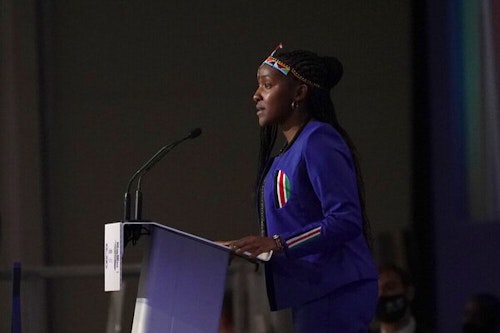
'Climate change can tear us apart', says Italian PM Draghi
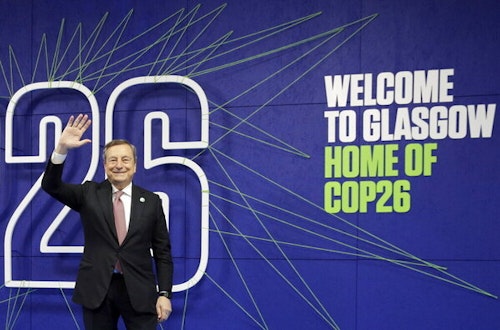
Sir David Attenborough emphasises 'inequality' in climate change impacts
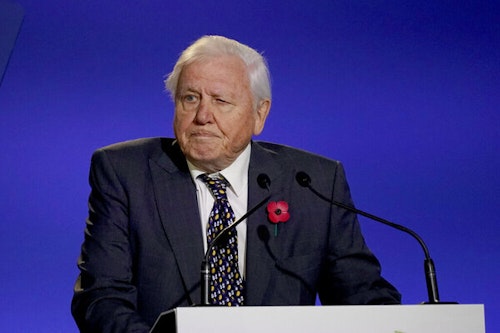
British broadcaster and naturalist Sir David Attenborough emphasised "inequality" in the way countries face the impacts of climate change.
"Today those who have done the least to cause this problem are being the hardest hit," he told world leaders at the opening ceremony.
Prince of Wales addressing COP26
'We face a stark choice': UN Secretary-General
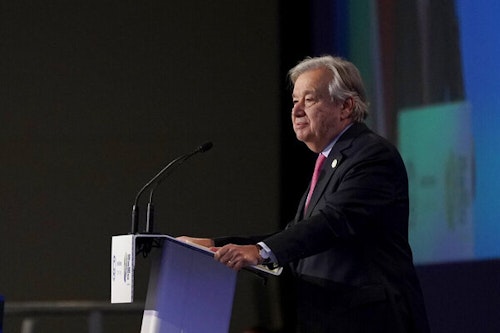
"And it's time to say, enough. Enough of killing ourselves with carbon. Enough of treating nature like a toilet. Enough of burning and drilling and mining our way deeper. We are digging our own graves."
Guterres urged major economic powers, including emerging nations like China, to "go the extra mile'' because they contribute the lion's share of global greenhouse gas emissions.
UK PM opening world leaders summit at COP26
Watch live: World leaders set out plans to curb emissions at COP26 opening ceremony
COP26: Watch climate activists dress up as world leaders in musical protest
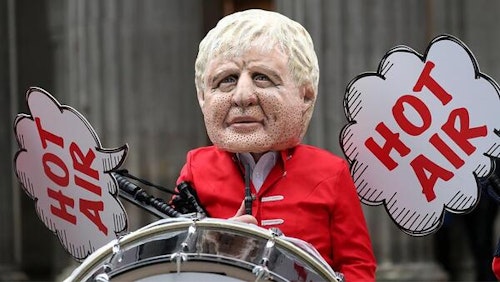
Seeing double: World leaders impersonated at COP26
Bagpiping activists in Glasgow have dressed up as world leaders ahead of the United Nations Climate Change Conference.COP26 is 'moment of truth,' says EC President
'Let's act now', tweets Spanish PM as he arrives in Glasgow
The climate crisis is a 'political decision', says activist
"We don't 'steer' randomly toward 2.7 or 3 or 5 degrees. Governments, investors & fossil corporations have decided to take this route," tweeted German climate activist Luisa Neubauer.
"The climate crisis is a political decision. And political decisions can be changed," she wrote.
'Last, best hope': UK appeals for action on climate as COP26 opens in Glasgow
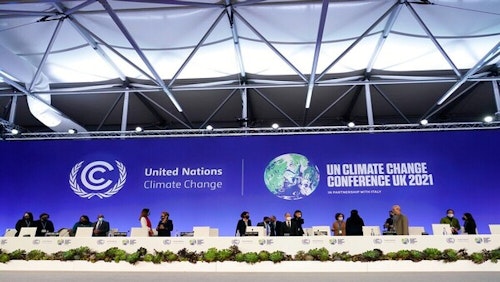
Turkey's Erdogan pulls out of COP26
The state-run Anadolu Agency said Erdogan's plane landed in Istanbul early on Monday.
Erdogan's office didn't provide an explanation for the change of plans. Turkish media reports said, however, that the Turkish president decided to cancel his trip to Glasgow over security concerns, following restrictions that would be imposed on the size of the Turkish delegation as well as on the number of their motorised vehicles.
Turkey's parliament ratified the Paris climate agreement last month after holding off for years as it sought to be reclassified as a developing country rather than a developed country.
COP26 delegates face big lines as leaders arrive
Prime Minister Boris Johnson and U.N. Secretary-General Antonio Guterres welcomed leaders one by one with elbow bumps and smiles Monday morning in front of a giant planet Earth on a blue background. The greetings were due to go on for hours, since more than 120 leaders are coming to Glasgow for the first two days of the 12-day summit.
Delegates, observers and journalists had a less welcoming experience as they arrived at the huge conference venue beside the River Clyde in Glasgow. Thousands lined up in a chilly wind to get through a bottleneck at the entrance to the venue, long before security. Some already turned back and decided to work from their hotels amid concern they won’t make it in on time for negotiating meetings.
With AP
Stay up to speed on COP26 with our newsletter
In our daily newsletter from November 1st to 12th, we’ll send you some of the most important takeaways from each day of the UN climate conference alongside a selection of in-depth stories and interviews. It’s the easiest way to stay on top of the news.
World leaders take centre stage at climate talks
"Humanity has long since run down the clock on climate change,'' British Prime Minister Boris Johnson was expected to say during Monday's opening session, according to partial remarks released by his office late Sunday. "It's one minute to midnight and we need to act now.''
The biggest names, including Biden, Johnson, India's Narendra Modi, France's Emmanuel Macron and Ibrahim Solih, president of hard-hit Maldives, will take the stage on Monday.
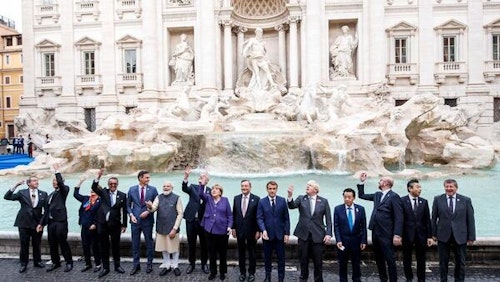
G20 leaders make mild pledges on carbon neutrality and coal financing
euronewsAs the COP26 climate conference begins in Glasgow, activists criticise the lack of concrete commitments undertaken by G20 leaders at their Rome summit.Everyone is talking about COP26 - but what actually is it, and why does it matter so much?
